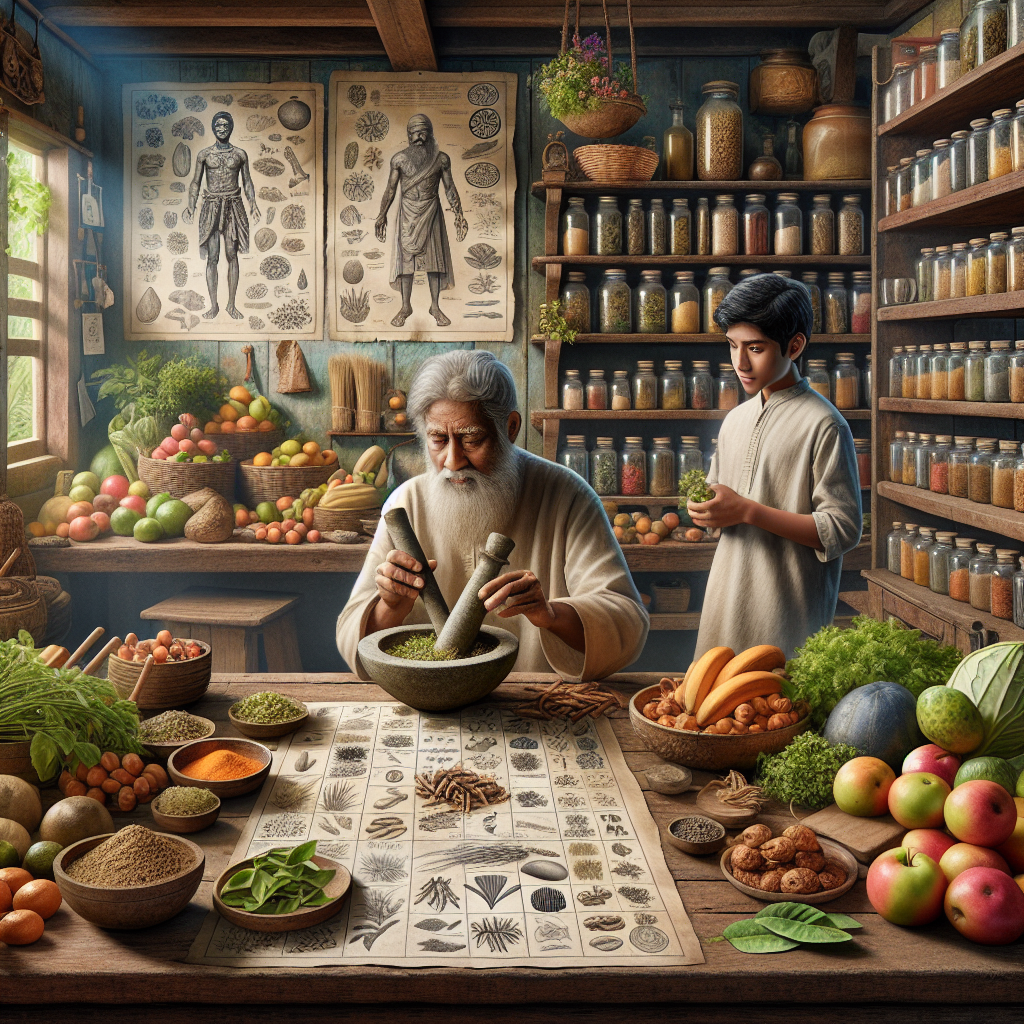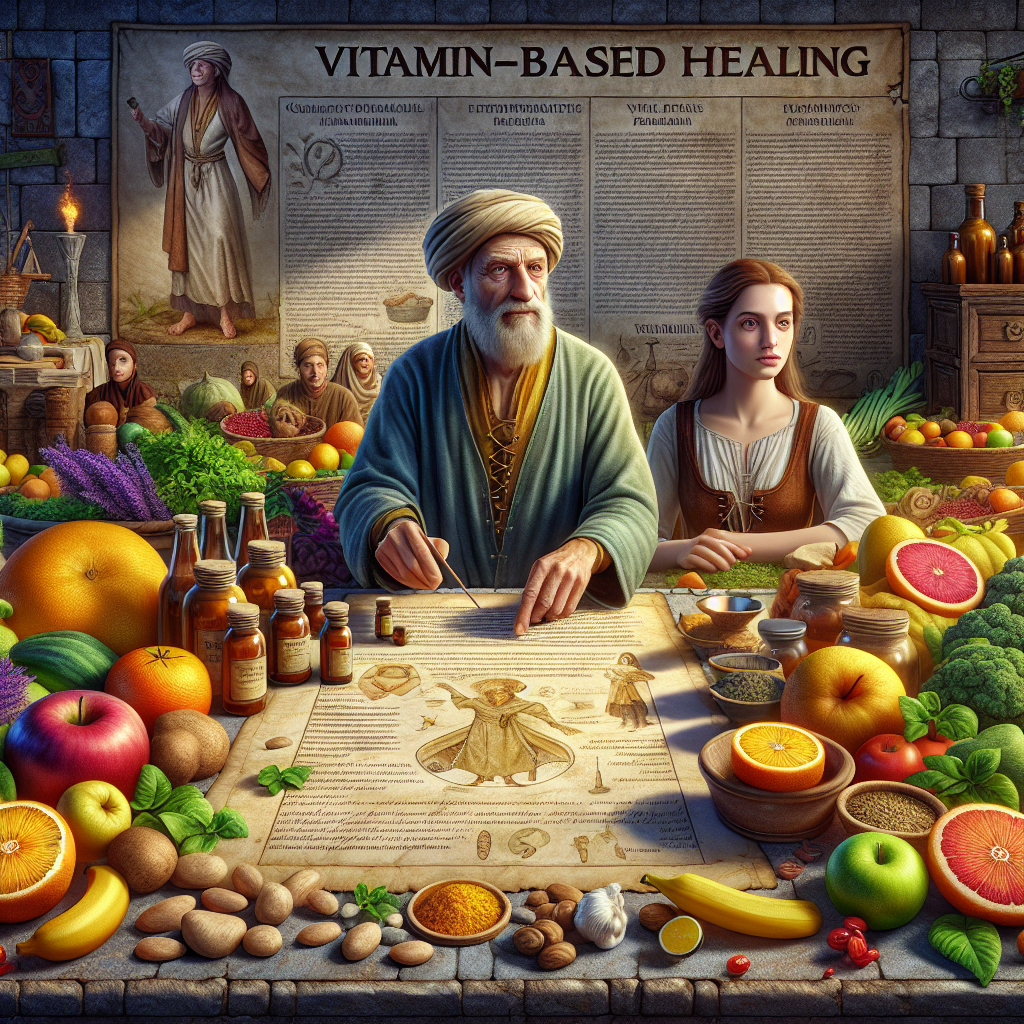Ancient Practices in Vitamin-Based Healing

Discover the secrets of ancient practices in vitamin-based healing! Uncover the wisdom of our ancestors and learn how to incorporate these time-tested methods into your modern lifestyle for optimal health. Visit My Vibrant Vitality now to start your journey towards a healthier you.
Exploring the Role of Vitamins in Ancient Healing Techniques
The ancient world was a treasure trove of knowledge and wisdom, particularly in the realm of health and wellness. Long before the advent of modern medicine, our ancestors had a profound understanding of the human body and its needs. One of the most fascinating aspects of this ancient wisdom is the role of vitamins in healing. This article will delve into the intriguing world of ancient practices in vitamin-based healing.
Vitamins, as we know them today, were not identified until the early 20th century. However, the ancients had an intuitive understanding of the importance of certain foods and substances in promoting health and healing. They may not have known about vitamins per se, but they certainly recognized the healing properties of foods rich in what we now know as vitamins.
The ancient Egyptians, for instance, were known to consume liver, a rich source of vitamin A, to improve night vision. Similarly, the Greeks and Romans recognized the importance of citrus fruits in preventing and treating scurvy, a disease caused by vitamin C deficiency. They may not have known the exact science behind it, but they understood the healing power of these foods.
In the East, traditional Chinese medicine and Ayurveda, the ancient Indian system of medicine, also recognized the importance of a balanced diet for health and healing. These systems emphasized the consumption of a variety of foods, including fruits, vegetables, grains, and animal products, to ensure a balanced intake of what we now know as vitamins and minerals.
The ancient Mayans, Aztecs, and Incas also had a deep understanding of the healing properties of certain foods. They consumed a diet rich in maize, beans, squash, and other foods that we now know are rich in vitamins and minerals. These civilizations also recognized the importance of sunlight in promoting health, which we now know is crucial for the production of vitamin D in the body.
The ancient practices in vitamin-based healing were not limited to diet alone. They also included the use of herbs and other natural substances that are rich in vitamins. For instance, the ancient Egyptians used honey, a rich source of vitamins B and C, for wound healing. Similarly, the Greeks and Romans used herbs like rosemary and thyme, which are rich in vitamins A and C, for various health conditions.
These ancient practices in vitamin-based healing are a testament to the wisdom of our ancestors. They recognized the importance of a balanced diet and the healing properties of certain foods and substances long before modern science confirmed their benefits. Today, as we grapple with a plethora of health issues, there is much we can learn from these ancient practices.
In conclusion, the role of vitamins in ancient healing techniques is a fascinating area of study. It underscores the importance of a balanced diet and the healing properties of certain foods and substances. As we continue to explore this intriguing aspect of ancient wisdom, we can gain valuable insights into the role of vitamins in promoting health and healing. Indeed, the ancient practices in vitamin-based healing are a rich source of wisdom that can guide us in our quest for health and wellness.
The Influence of Vitamin-Based Remedies in Ancient Medicine

The ancient world was a treasure trove of knowledge and wisdom, particularly in the realm of medicine. Long before the advent of modern pharmaceuticals, our ancestors relied on the natural world to cure their ailments and maintain their health. Among the many resources they utilized, vitamins, derived from various food sources and herbs, played a pivotal role. This article delves into the influence of vitamin-based remedies in ancient medicine, shedding light on the practices that have shaped our understanding of health and wellness today.
The concept of vitamins, as we understand it today, did not exist in ancient times. However, the ancients had an intuitive understanding of the healing properties of certain foods and herbs. They recognized that these substances could not only provide sustenance but also restore health and vitality. This understanding was the foundation of many ancient medical systems, including those of the Greeks, Romans, Egyptians, and Chinese.
In ancient Greece, the father of medicine, Hippocrates, advocated a diet rich in fresh fruits, vegetables, and whole grains. He believed that such a diet could prevent and cure diseases. This philosophy aligns with our modern understanding of vitamins as essential nutrients that support various bodily functions. Similarly, in ancient Rome, the physician Galen recommended a balanced diet to maintain health and treat illnesses. He emphasized the importance of consuming a variety of foods to ensure a sufficient intake of all necessary nutrients.
In ancient Egypt, medical papyri reveal a deep understanding of the healing properties of certain foods. For instance, they prescribed raw liver, rich in vitamin A, for night blindness. Similarly, they recommended onions, a good source of vitamin C, to ward off scurvy. These practices demonstrate an early recognition of the role of vitamins in maintaining health and treating diseases.
The ancient Chinese were also pioneers in the use of vitamin-based remedies. Traditional Chinese Medicine (TCM) is a holistic system that emphasizes the importance of diet in maintaining health and treating illnesses. The Chinese recognized that certain foods and herbs could nourish the body and restore balance. For instance, they prescribed goji berries, rich in vitamins A and C, to support the immune system and improve vision.
These ancient practices have had a profound influence on our modern understanding of vitamins and their role in health and wellness. Today, we recognize that vitamins are essential nutrients that our bodies need in small amounts to function properly. We understand that a deficiency in any one vitamin can lead to specific diseases, just as the ancients intuitively understood.
Moreover, the ancient practice of using vitamin-based remedies has shaped our approach to health and wellness. Today, many people turn to dietary supplements to ensure they get the necessary vitamins. This trend reflects the ancient belief in the healing power of vitamins.
In conclusion, the influence of vitamin-based remedies in ancient medicine is undeniable. Our ancestors’ intuitive understanding of the healing properties of certain foods and herbs has shaped our modern understanding of vitamins and their role in health and wellness. As we continue to explore the potential of vitamins in preventing and treating diseases, we are, in a sense, following in the footsteps of our ancient forebears. Their wisdom continues to guide us as we strive to maintain our health and vitality in a natural and holistic way.
Unveiling the Secrets of Ancient Vitamin-Based Healing Practices
The ancient world, with its myriad of cultures and civilizations, was a treasure trove of knowledge and wisdom. Among the many secrets it held, one of the most fascinating is the practice of vitamin-based healing. This ancient practice, which predates modern medicine by thousands of years, is a testament to the ingenuity and resourcefulness of our ancestors. It is a testament to their understanding of the natural world and their ability to harness its power for the betterment of their health.
Vitamin-based healing is a practice that involves the use of vitamins, minerals, and other nutrients to promote health and treat various ailments. This practice is rooted in the belief that the body has an innate ability to heal itself, given the right conditions and resources. It is a belief that has been validated by modern science, which has shown that certain nutrients can indeed support the body’s healing processes.
The ancient Egyptians, for instance, were known to use foods rich in certain vitamins to treat a variety of ailments. They used onions, which are high in vitamin C, to fight infections and boost the immune system. They also used honey, a natural source of various vitamins and minerals, to treat wounds and promote healing.
Similarly, the ancient Greeks and Romans recognized the healing power of certain foods. They used fruits and vegetables, such as apples and cabbage, which are rich in vitamins A and C, to maintain good health and prevent diseases. They also used herbs and spices, such as garlic and oregano, which are known for their antimicrobial properties, to treat various infections.
In the East, the ancient Chinese and Indians also practiced vitamin-based healing. They used a variety of herbs, fruits, and vegetables, which are rich in various vitamins and minerals, to promote health and treat diseases. They also developed complex systems of medicine, such as Traditional Chinese Medicine and Ayurveda, which incorporate the use of these nutrient-rich foods.
These ancient practices were not based on mere superstition or guesswork. They were based on careful observation and experimentation. Our ancestors observed the effects of different foods on the body, and they experimented with different combinations to find the most effective treatments. They understood, long before the advent of modern science, that the body needs a variety of nutrients to function properly and that a deficiency in any of these nutrients can lead to disease.
Today, we have the benefit of scientific research to validate these ancient practices. We know, for instance, that vitamin C is essential for the immune system and that a deficiency can lead to scurvy. We also know that vitamin A is crucial for vision and that a deficiency can lead to night blindness. We know that certain minerals, such as calcium and magnesium, are necessary for bone health and that a deficiency can lead to osteoporosis.
In conclusion, the practice of vitamin-based healing is a testament to the wisdom and resourcefulness of our ancestors. It is a practice that has stood the test of time and that continues to be relevant today. It is a practice that reminds us of the power of nature and the importance of a balanced diet. It is a practice that, despite the advances of modern medicine, still holds valuable lessons for us today.